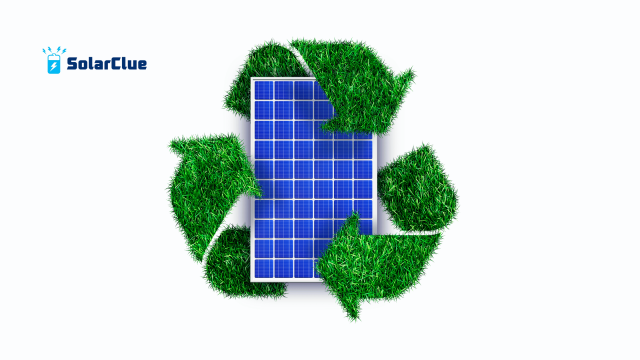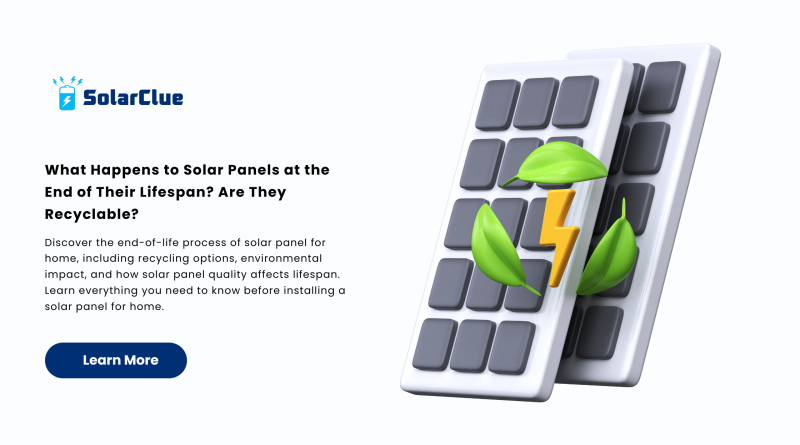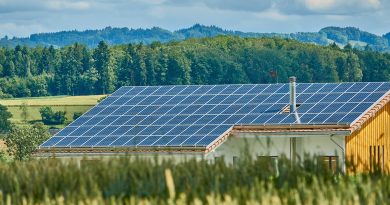What Happens to Solar Panels at the End of Their Lifespan? Are They Recyclable?
On average, a solar panel lasts about 25 to 30 years. While this doesn’t mean the panel stops working entirely, its solar panel efficiency typically drops below the optimal level, making it less effective for energy production. This is when many homeowners consider replacing them with a best solar panel to maximize output and savings.
Table of Contents
- 1 What Happens to Old Solar Panels?
- 2 Are Solar Panels Recyclable?
- 3 Components of a Solar Panel That Can Be Recycled
- 4 How Does Recycling Work?
- 5 Environmental Benefits of Recycling Solar Panels
- 6 Challenges in Solar Panel Recycling
- 7 The Role of Solar Panel Quality in Longevity
- 8 How to Choose the Best Solar Panel for Home
- 9 Solar Panel Price vs. Longevity
- 10 Regulations and Initiatives Supporting Recycling
- 11 Manufacturers Leading the Way in Solar Panel Recycling
- 12 How Homeowners Can Recycle Solar Panels
- 13 Innovations in Solar Panel Recycling
- 14 Future Outlook: Towards a Circular Solar Economy
- 15 Conclusion
- 16 FAQs
What Happens to Old Solar Panels?
Once solar panels reach the end of their productive lifespan, they can either be reused, refurbished, or recycled. Reuse is only an option if the panels are still functional and can serve secondary purposes. Otherwise, responsible disposal or recycling is essential to minimize environmental harm.
Are Solar Panels Recyclable?
Yes, solar panels are recyclable. Most panels are made from glass, aluminum, and silicon—materials that can be separated and reused. Specialized recycling centers break down these components to repurpose them in the manufacturing of new panels or other products, thus supporting a circular economy in the renewable energy sector.
Components of a Solar Panel That Can Be Recycled
- Glass: Makes up about 75% of the solar panel, easily recyclable.
- Aluminum frame: Can be melted down and reused.
- Silicon cells: Recoverable and reusable for manufacturing new panels.
- Plastic components: Often incinerated or downcycled.
How Does Recycling Work?
The recycling process typically involves disassembling the solar panel, separating materials, and treating them accordingly. Thermal, chemical, and mechanical processes are employed to extract valuable elements. Advanced technologies even enable the extraction of rare metals like silver and indium.
Environmental Benefits of Recycling Solar Panels
Recycling reduces e-waste, lowers the demand for raw materials, and supports sustainable energy practices. Instead of dumping old solar panels into landfills, recycling promotes environmental stewardship and enhances the credibility of renewable energy solutions.
Challenges in Solar Panel Recycling
Despite its advantages, solar panel recycling is not yet widespread. Limited facilities, high processing costs, and lack of awareness are barriers. However, as the volume of end-of-life solar panels increases, more policies and technologies are emerging to tackle this issue.
The Role of Solar Panel Quality in Longevity
Choosing a high-quality solar panel is crucial to extending its lifespan and reducing waste. Premium panels are more resilient, require fewer replacements, and offer higher solar panel efficiency over time. Investing in the best solar panel saves you money and reduces your environmental impact.
How to Choose the Best Solar Panel for Home
When selecting a solar panel for home, consider efficiency, durability, warranty, and brand reputation. Sites like solarclue.com provide comprehensive listings to help you compare solar panel price, specifications, and user reviews for the best solar panel options available in the market.
Solar Panel Price vs. Longevity
While it may be tempting to go for the cheapest option, low-cost solar panels often compromise on durability and solar panel quality. Over time, this leads to quicker replacements and higher lifecycle costs. Opting for a higher solar panel price upfront often translates to better performance and lower environmental impact.
Regulations and Initiatives Supporting Recycling

Many regions now mandate recycling for photovoltaic equipment. For instance, the European Union enforces directives requiring manufacturers to take responsibility for recycling old solar panels. In India and the U.S., similar policies are under development, encouraging eco-friendly disposal methods.
Manufacturers Leading the Way in Solar Panel Recycling
Brands like First Solar and SunPower have already implemented recycling programs, aiming to recover up to 90% of a panel’s components. These initiatives are setting industry standards and paving the way for a more sustainable future in solar energy.
How Homeowners Can Recycle Solar Panels
If you’re a homeowner, start by checking if your installer offers take-back or recycling services. Alternatively, consult platforms like blog.solarclue.com for guides on how to dispose of or recycle your solar panel for home responsibly.
Innovations in Solar Panel Recycling
Emerging technologies are making recycling more efficient and affordable. Automated disassembly, chemical recovery, and AI-driven sorting systems are revolutionizing the way we handle old solar panels, making the process more viable at scale.
Future Outlook: Towards a Circular Solar Economy
As adoption grows, so will the need for end-of-life management. Governments, manufacturers, and consumers must collaborate to build a sustainable lifecycle for every solar panel, from production to recycling. The future lies in a closed-loop system where nothing goes to waste.
Conclusion
Understanding what happens to solar panels at the end of their lifespan helps us make informed choices today. By prioritizing solar panel quality, choosing the best solar panel, and supporting recycling initiatives, we can make a difference in the renewable energy landscape. Next time you’re comparing a solar panel price, think beyond the cost—consider the full lifecycle and the planet you’re preserving. Curious to explore more? Visit solarclue.com or dive into expert insights on blog.solarclue.com for your solar journey!
FAQs
1. Are all solar panels recyclable?
Most solar panels are recyclable, especially those made with silicon. However, recycling availability depends on regional facilities and regulations.
2. How can I dispose of my old solar panel for home?
Contact your manufacturer or installer to check for recycling programs. You can also explore third-party recycling companies or government-supported e-waste centers.
3. What affects solar panel efficiency over time?
Factors like dirt accumulation, weather damage, and material degradation impact solar panel efficiency. Regular maintenance can slow efficiency loss.
4. Is it worth investing in the best solar panel?
Absolutely. High-end solar panels provide better output, last longer, and reduce the need for early replacement—making them more cost-effective in the long run.
5. Can solar panels be reused?
Yes, if they’re still functional. Some second-hand markets and organizations accept used solar panels for low-cost installations in less demanding applications.




